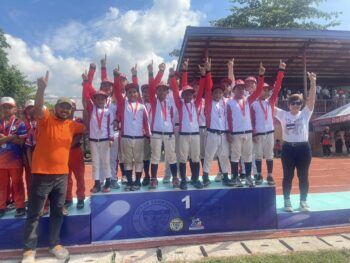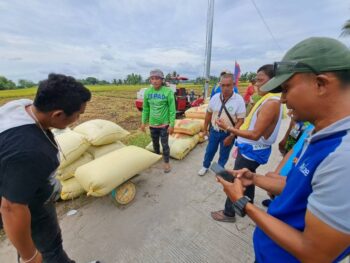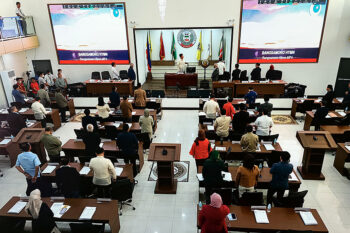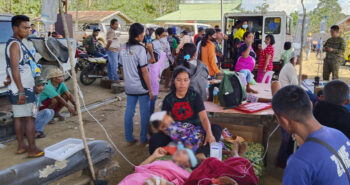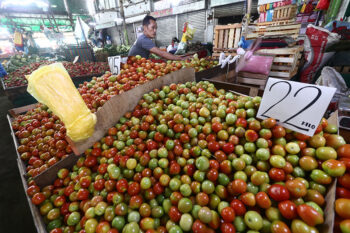
ILIGAN CITY (MindaNews / 10 October) – As far as I can recall and from what I have heard from my elders, there was never any major problem in the interaction among the people, none of whom were large enough to dominate one another. Each group carried his own culture and language yet somehow they were able to communicate.
Opportunities for interaction abound, the more common among which were and still are the Saturday market day, a half day affair, when people converged into town, the bayanihan called pintakasi, in farm work (opening the land, sowing, harvesting, etc.), building of houses, and construction of the school building. Day to day among neighbors would include request for fire, salt, borrowing rice, and other farm products, or food items, needle and thread, knives, shovel, pick, harrow and farm implements and returning the favor.
There were also other social occasions like wedding celebrations, a dance and so on. Invitations for social celebrations was always for the whole family. It was considered bad manners to invite only one or two members of the family. Even when written invitations became fashionable, the envelope would always have this addressee: “To Mr. and Mrs. __ and family.” It was a social crime to omit “and family.” As far as I can remember no celebrant had ever complained of having run short of food.
A number of times I recall somebody from several kilometers away would say “Tao po!”(roughly translated in English as “I am a human being announcing my presence and I mean well; the Bisaya is a contracted “Maayo” or just “Ayo” meaning “Good”) very late in the evening.
The Teduray announces his presence with “ehem” “ehem” and stops when acknowledged. My father or my mother would respond, the fellow would introduce himself, explain his presence and request for a place to sleep for the night; my mother would cook dinner and a sleeping space would be prepared which sometimes was under the kitchen table where one of us would be asleep.
Very early, even before anyone was awake, he would depart quietly without waking anybody in the household. That was perfectly okay. What may have been bad manners “nakakahiya” or shameful was for the guest to wait for breakfast. I do not know really because it never happened that anyone waited for breakfast before departing.
Our house was never locked. Anything of value was just lying in the open in or outside the house for anyone who would care. But we have never been robbed. Nor did anyone try to enter the house.
Our nearest neighbor was an Ilonggo family a kilometer away towards the west; the next nearest, a Bol-anon (from Bohol) family about a kilometer and a half away towards the south; the next was also from Bohol a kilometer and a half towards the northeast. And so on. But for purposes of pintakasi, neighbors from as far away as two or three kilometers would be invited to help and they would come. The gesture is reciprocated in kind. During pintakasi, work begins as soon as participants arrive, breakfast, a heavy meal, would be at around 9:00 a.m., lunch at noon, snack, light but plentiful, at around 3:00. Female neighbors would also be invited to help in the kitchen work.
Talks would naturally focus on farming, seeds, harvest, beliefs, prices of farm products, tools, and so on. But what I find interesting is the unspoken sanction in pintakasi. One who responds to a bayanihan call in farming can always expect a return in kind. If I plow your field, you plow mine, so to speak. The sanction comes this way. Participants expect to be fed generously. In the round robin, the stingy or the one who serves inadequate food will subsequently be given all kinds of excuses, never a positive yes to an invitation.
Me, I always looked forward to a pintakasi because this always meant good food throughout the day. My mother is a good cook. Her adobo is superb, so is her tinolang manok, for the afternoon merienda she serves coffee or chocolate or peanut butter drunk a la chocolate and puto or bibingka or ginataan. We have never been sanctioned! My father saw to it that my mother had the wherewithal for such occasions. He was always generous to neighbors.
There was never any Muslim or Teduray, none within the neighborhood, in my father’s pintakasi. But during harvests, everybody would come. This is when we had some Teduray from around the area and Maguindanawon from as far away as the coastal villages. The latter would in fact stay during the entire harvest season to take part in the harvest activities. Afterwards, they would hike back to their villages.
As far as I can remember, all verbal transactions during pintakasi and market day and all other social occasions were in a mixture of languages. That is why I grew up with Tagalog, Ilonggo, Teduray, Ilocano, and Maguindanao.
My family
We are eleven in the family. My tatay Deogracias, born 1902 and passed away in March 1986; my nanay, Obdulia, born 1908. We are nine children, two female (my eldest sister and the eighth) and seven male. The eldest was born in 1927 and the youngest in 1951. I was the seventh, born on October 7, 1942. Some of us are now grandparents.
They were eight when they migrated from Indang, Cavite in 1940, three more were born in Mindanao. I was the first Mindanawon in the family. I almost died “from kombulsyon, my mother said, during evacuation at Casisang, at the plains west of our hilltop home, in World War II.
Straight from peasant life, they came to Cotabato paga destino, meaning my father promised to pay their fare when they arrived which arrangement was apparently allowed by the shipping company at that time. So, when the boat docked, actually anchored at sea because the ships could not sail-zigzag upriver of Pulangi (then called Rio Grande River); only smaller launches could dock at the city wharf, my father got off to look for a relative while his family was “hostaged” in the ship.
They went to Upi because my uncle, elder brother of my mother, was already there ahead of them. They were completely on their own, no support from the government. They acquired a homestead of 16 hectares. Later when this was surveyed and titled, it was actually 18 hectares.
My parents never went to school but they made sure all their children did. My father did the backbreaking work in the farm. He got plenty of helping hands when we were home, but especially after my brothers finished high school. Upi Agricultural High School was the only one. We all finished high school except my eldest brother who only got as far as third year. Three finished college in the city. One finished a college vocational course. I am the only who reached graduate school.
My brother, the fifth in the family, did the farm work and supported me partly through college, that is, before I became a working student. Later, he, too, had to leave farming after he broke his clavicle in a cycling race on a rocky road with his friend. He took a part time job and enrolled in a business course. Later, he discovered he had more inclination for machines and took up auto-mechanics in the vocational department of Notre Dame College. I was secretary of the rector then and helped him land a job as bookbinder. I worked for a year as the secretary of the College President, then called Rector, and later as traffic manager of the school radio station.
My brother, the sixth in the family, who worked his way through high school and college, helped my younger sister finish college. The two schools in Upi, Dinaig Central and Upi Agricultural High School, a secondary institution were very much a part of our family life as they were part of every family’s life. I missed matriculation at Upi Agricultural only because when I went to enroll I was rejected. They said I was too tiny and did not seem physically able to cope with farm work, including plowing with cows or carabaos, which was part of the curriculum.
I was an out of school youth for a year. Ate, who was married already by then, sent for me and I stayed with her in Cotabato City. That was when I saw my first movies, once a week for a whole year; I also had plenty of ice drop. The following year, I enrolled at Notre Dame Boys Department, an exclusive boys school, along with my brother Gervacio. I began to see the wider world.
High school in the city had its own excitements. For four years, the pattern of life was as regular as sundown and sun up. Every Saturday I would go home to get six gantas of rice, viand and firewood or bamboo for a week’s supply. Tuition in those days was seven pesos a month in first year and eight pesos after that. The family was not subsisting on a cash economy and money was hard earned. My father had to sell several chickens for my monthly tuition. Each regular size chicken was worth 1.50, sometimes only 1.00. My being tiny helped, too. Because of my size, I looked like a child and I was not charged the regular 1.00 fare by the bus conductor — for two years. I started paying one-half fare only in third year.
Notre Dame required a uniform, khaki pants with green stripe on the side and white T-shirt. I had one pair of pants per year, two T-shirts and one pair of black shoes, Ang Tibay brand. I did my own laundry and ironing, the one that uses charcoal. Catholic students were taught catechism, too. I, learned that “The Catholic church is the only true church and outside the Catholic church there is no salvation.” Oh, well…Catholics should be glad there was Vatican II; in 1963, that was when I heard from the Bishop that it was replaced with ecumenism. In short, live with non-Catholic neighbors!
Among us, our parents never learned to speak any of the local languages in the place. We, the children who grew up with these tongues among our playmates and schoolmates managed without difficulty. If my mother had her way, she would have wanted all her in-laws to be “from back home.” That was not to be and she learned to accept without culture shock a mixture of in-laws: Tagalog, Pangasinan-Teduray, Bol-anon, Bisaya, Ilongga, and Leyte Bisaya.
My mother is 90 [in1998], still walking straight (no stoop), complains of feeling cold in the joints occasionally, especially on cold nights, from a mild form of rheumatism, but is very much in command in her own household. A nephew and a hand live with her in Upi. We get our water some five hundred meters from a spring nearby which is of a higher elevation than our house. To spare my mother the trouble of having to fetch her water, because she will certainly do that if she has to, my youngest brother constructed a bamboo aqueduct to bring the water some twenty meters near her doorstep. There is no way that she can be persuaded to live with any of her children where she usually has nothing to do anyway except sit around and sleep. She is happiest when she is working; she is awful when she is doing nothing. When she is out in the city (Cotabato) or elsewhere, her thought is always with her chickens.
I sent her woolen sweater and sweat pants last year when I heard about her problem with cold but when we (a brother, sister in law and myself) visited her last September 6 last year (September 5 was her birthday), the two nights we were there was cold and she made me wear both sweat shirt and pants and would not take no for an answer. I smelled that these were not worn yet since she received them! She also told (I mean told) me to occupy the other bed in the house. There are only two beds in the house; she had the other one.
The city in my childhood was only one, Cotabato City. It is called Cotabato. General Santos was still Rajah Buayan, later Dadiangas, later General Santos.
Family reunion for us, the practice of which started in 1956, never had perfect attendance. The biggest attendance was in 1985, the year before my father died, only the two eldest were absent.
We are now all over: one in Davao City, another in Agusan del Sur, another in Cotabato City, another in Marbel, another in Iligan (me), another in Cavite, three still in Upi. Only our youngest has maintained his ties with the farm and draws livelihood partly from it. There were forces that drove us to seek greener pastures elsewhere. Upi may be green but it did not have the answer to some of our dreams. [Now, 2022, only two remain alive, me and my younger sister.]
There is one trait that we all learned from our parents: Never complain in the face of hardships.
(MindaViews is the opinion section of MindaNews. Rudy Buhay Rodil posted these notes on his 80thbirthday on his Facebook wall. MindaNews was granted permission to share these notes)


